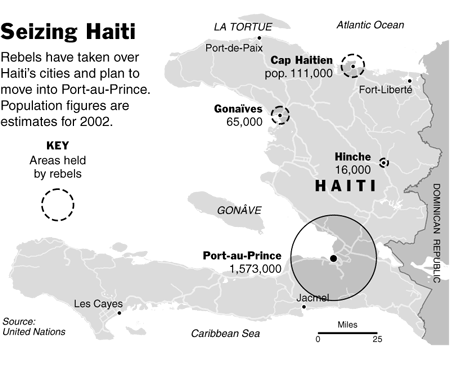| JEAN-BERTRAND ARISTIDE: A former slum priest, Aristide was extremely
popular when he became Haiti's first freely elected leader in 1990. The army ousted him in
1991, brutalizing and murdering his supporters until the United States intervened in 1994.
Aristide was re-elected in 2000 but has lost support since flawed legislative elections
that year led international donors to freeze millions of dollars in aid. Opponents accuse
him of breaking promises to help the poor, allowing corruption fueled by drug-trafficking
and masterminding attacks on opponents by armed gangs — charges the president denies.
Besieged by a rebellion, Aristide has accepted a settlement plan supported by the United
States, other Western Hemisphere countries and the European Union. ANDY APAID JR.: The
most outspoken leader of the opposition coalition, Apaid is a factory owner born in the
United States. His family fled Haiti under Francois Duvalier, or "Papa Doc," who
ruled from 1957 to 1971. Favoring pressed pastel shirts and gold-rimmed glasses, Apaid
looks like a Miami businessman but says he is totally Haitian at heart. "I am just as
much a part of this country as anyone," Apaid, in his early 50s, said recently.
"That's why I am saying we must choose another path for the country." But
without a constitutional amendment, he will never become president because of his dual
nationality. He has rejected the U.S.-backed settlement plan, saying Aristide must leave
office.
EVANS PAUL: Another top figure in the opposition coalition, Paul is a former mayor of
Port-au-Prince, the Haitian capital, who was in hiding from the brutal military regime
during much of his term until U.S. troops arrived in 1994. Paul, who is in his late 40s,
was head of a center-left coalition that nominated Aristide for president in 1990. Paul
managed Aristide's successful election campaign but broke ranks after Aristide left him
out of his inner circle. A playwright and journalist when dictator Jean-Claude Duvalier
ruled Haiti, Paul was jailed for opposing him.
GUY PHILIPPE: The 35-year-old leader of a motley band of rebels threatening to take
over Haiti, Philippe joined the revolt a week after it was started in Gonaives by a street
gang that used to terrorize Aristide's opponents and turned on Haiti's president after its
leader was assassinated. Philippe came from neighboring Dominican Republic, where he fled
in 2000 amid charges he was plotting a coup.
Philippe was born to peasants near the provincial town of Jeremie and is a former army
officer who training at a military academy in Ecuador when Aristide disbanded the army. He
returned to Haiti and was named by Aristide as former assistant police chief for northern
Haiti. Haiti's military has a history of ruling with brutality, but Philippe says soldiers
should stay in the barracks and insists that, under his command, things would change.
DOMINIQUE DE VILLEPIN: The French foreign minister who took the spotlight when he
squared off against Secretary of State Colin Powell at the U.N. Security Council debates
before the Iraq war, de Villepin is now working with Powell to find a solution to the
crisis in Haiti, France's former colony. De Villepin is trying to arrange separate
meetings in Paris with Aristide and opposition leaders later in the week.
ROGER NORIEGA: The State Department's top official for Latin America, Noriega is
working closely with multinational bodies, such as the Organization of American States and
Caribbean Community, to find a peaceful, democratic solution for Haiti. Noriega is a
seasoned Latin hand who has singled out Fidel Castro for destablishing democratic
governments and called on Castro's friend, Venezuelan President Hugo Chavez, to observe
the rule of law. The U.S. czar for Latin America was Sen. Jesse Helms' chief aide on the
region before being appointed ambassador to the Organization of American States. Last
year, with the support of conservative groups, he became the first assistant secretary of
state for Latin America to win Senate approval since 1996.
BUTEUR METAYER: The street gang leader who started Haiti's rebellion freely admits that
he used to go around terrorizing Aristide's opponents. Metayer says Aristide armed his
Cannibal Army gang for that purpose. The gang turned on Aristide after gang leader Amiot
Metayer, Buteur's brother, was assassinated last year, accusing the government of
silencing him to prevent him giving damaging information about Aristide. Aristide denies
any involvement with the gang. Buteur, who wears bands of bullets across his chest, has
small ambitions: Last week he declared himself president of Haiti's central Artibonite
district. Like the other rebels, he says Aristide has to go before he'll lay down his
arms.
LOUIS-JODEL CHAMBLAIN: This sergeant in the now-disbanded Haitian army headed death
squads in 1987 that intimidated voters before the army aborted November elections in a
bloodbath of voters. After the army ousted Aristide in 1991, he became co-leader of the
feared FRAPH death squad that is blamed for the murder, torture and maiming of hundreds of
Haitians, particularly Aristide's slum supporters. He fled to the Dominican Republic when
U.S. troops intervened in 1994, and returned to the country two weeks ago to join the
rebellion. Chamblain has been convicted, in absentia, and received two sentences of life
imprisonment for his role in a 1994 raid on Gonaives' Raboteau slum — where Metayer
holds sway today — and the 1993 assassination of Aristide financier Antoine Izmery.
Copyright © 2004 The Associated Press. Reprinted from The Associated Press, Wednesday,
February 25, 2004. |

